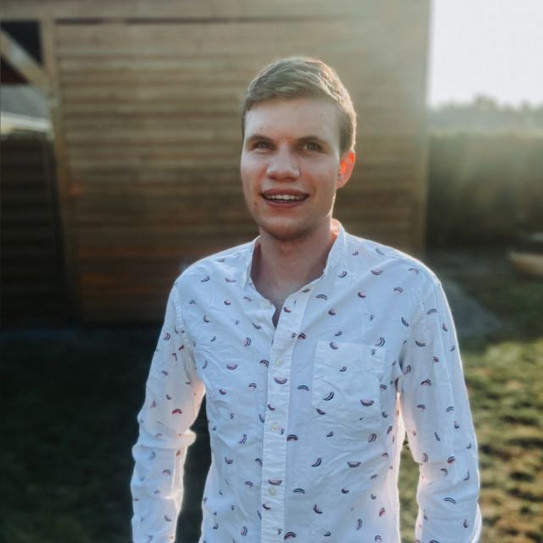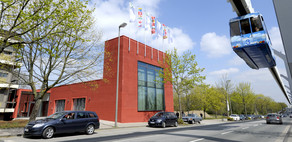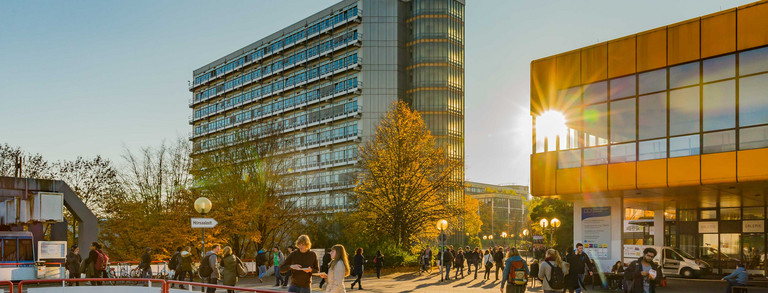Max

Max, a student of Applied Linguistics at TU Dortmund University, had to - but also wanted to! - to study abroad. That's a big challenge for many people, but with a visual impairment it's a whole other ball game. But thanks to the additional funding for people with special needs or chronic illnesses as part of Erasmus+ , even the biggest challenges can be overcome.
In this interview, Max gives us an insight into his preparations and everyday life in his Erasmus+ semester abroad.
Interview
1) Why did you choose Athens for your Erasmus+ stay abroad?
Athens offers many reasons for a visit. Whether it's the culinary specialties, the beautiful Greek weather or the super nice people - I can confirm everything after my stay. Of course, there were also professional and personal reasons for me: A semester abroad is compolsory in my degree program, which was not an additional hurdle for me, but a plus point, because I already knew that I would like to go abroad during my studies - so it was a win-win. In terms of subject matter, the content and seminars that I discovered on the website of the Kapodistrean University of Athens also fitted in very well with what I had already done and wanted to do. Last but not least, I had already met a few people from there through European-international projects that I helped organizing as part of the Erasmus+ programme.
2) Was this your first stay abroad? Or have you already had other international experiences that helped you to take this step?
I had already been abroad for just under a year before my studies after graduating from high school. I did a European Voluntary Service (now European Solidarity Corps) with VIEWS International, an organization in Liège in the heart of the French-speaking part of Belgium, where I got to know lots of people from all over Europe at international youth encounters, meetings, seminars and training sessions and had a really good time. During this time, I learned to appreciate and love European cohesion and the incredible diversity of our cultures. In addition to my office work on translations (English-French and French-English), the website, articles for the newsletter, etc., I was involved in international, mostly inclusive (youth) projects as an activity leader, organizer, moderator and co-developer. This great experience was definitely a strong reason for wanting to have another great experience abroad.
3) Students with disabilities and/or chronic illnesses still go abroad relatively rarely. How would you encourage these students to study abroad despite their limitations?
Just do it! There is so much to gain, learn, experience and discover that no barrier can outweigh. In general, I always think that it helps not to be too afraid of possible limitations, but rather to simply try out what else is out there and what else is possible. A lot is possible, even if you think it's difficult. Besides, you can find difficulties everywhere, even in your own country - and there are just as many super nice people elsewhere who are happy to help you if you ask nicely; people who are super open-minded. And if you approach these people with the same openness, there's so much to discover, it's always a great experience and it's different everywhere. What's more, you're never alone in your home country. At the TU, for example, there is the International Office, which helps you with everything and guides you through the paperwork jungle that comes with an Erasmus stay in a very friendly and relaxed way. For more specific issues, there are also the people from DoBuS, who are on hand with their expertise, advice and support to make sure everything runs smoothly. If there are special, individual difficulties or needs, a compensatory solution will definitely be found, so don't worry.
At the university in Athens, I was assigned two "buddies" thanks to the very active European Student Network: a sighted fellow student from my subject area who was able to answer a lot of my questions, especially at the beginning, and one who was studying something else but was blind like me and therefore knew what to do in all more specific matters. The University of Athens also did a very good job, so I can only recommend it in this respect. Of course, other universities in Europe certainly are also cooperative and open to you, so just go for it - everything will be fine.
4) Did the culture meet your expectations? Are there any clichés that are really true?
The culture definitely met my expectations. The people there were all super nice, open-minded and caring. Of course, there are clichés about every culture, and some of them didn't come about for no reason - for example the one about the really good (but of course also very meat-heavy) Greek food, there are really, really tasty delicacies to discover - the typical (olives, feta or of course souflaki and gyros - not only on a skewer but also as a snack in pita bread with chips, tzatziki/sauce and salad) or homemade dishes such as kokinisto (super tasty! try it when you're there and think of me). At university, of course, there was also something to eat in the canteen - there were hot meals at lunchtime and in the evening, and everything was included with a Mensacard. But: the Germanized combination menu of gyros with rice and tzatziki doesn't exist in this form in Greece. Even before my semester abroad, Greek people regularly got culture shocks and uncomprehending looks when it was served to them as typical Greek food elsewhere. And of course, the country's liquid treasures - whether olive oil or wine and Uso - are also worthwhile. Nevertheless, it would be wrong to reduce this beautiful country to culinary clichés, historical sights or the history of the ancient Greeks, including the invention of democracy, of which the Greek people are naturally proud. It is above all these people who have stayed in my memory, who made my stay abroad what it was and all of whom I have taken to my heart. That alone makes the experience worthwhile. And yes, the cliché is often true that many of them are very temperamental and emotional, but at the same time they are also more relaxed and simply less uptight or closed-minded - you can sometimes take a leaf out of their book. Despite all this, every cliché has its gaps in diversity. For example, there is of course the typical Greek music with mpouzouki, which is probably all too stereotypical when you think of Greece. On the other hand, there is also pop music in Greek. In recent years, trap music has also been very popular there, and even the Erasmus students have sung along or tried it at some point. Greek culture is definitely very diverse, there's a lot to discover and of course there are also things you can learn from. As a fan of languages, it was of course also a great opportunity for me to get to know the Greek language and to practise it directly in many conversations. In Germany, I often hear that it sounds a bit like Spanish - but maybe it just seemed Spanish ...
There's a lot more to tell - about traditional holidays, special features, beautiful and unusual customs and much more, but it's much nicer to experience it all for yourself than just reading about it. So, what are you waiting for?
5) What cultural/linguistic misunderstandings did you have? Was there a funny anecdote/situation you would like to share with us?
Cultural and linguistic misunderstandings naturally always occur when different cultures or languages meet. They usually cause confusion at first and then end with everyone involved laughing their heads off. There was a linguistic misunderstanding in English during my first few days there: I was new to the seminar and a very friendly student approached me to find out who I was. In conversation, she asked me: "How did you come to Greece?". What she actually wanted to know was: How did you come to be in Greece? Why did you choose it? What I understood from the wording: How did you come to Greece? My answer was short and direct: by airplane. She was already thinking: Oh dear, that's it for the conversation. But we quickly cleared up the misunderstanding and since then we always laugh when we think back to our first conversation.
Max is also a musician - you can listen to his songs on Spotify and YouTube and anywhere else you can stream music.










